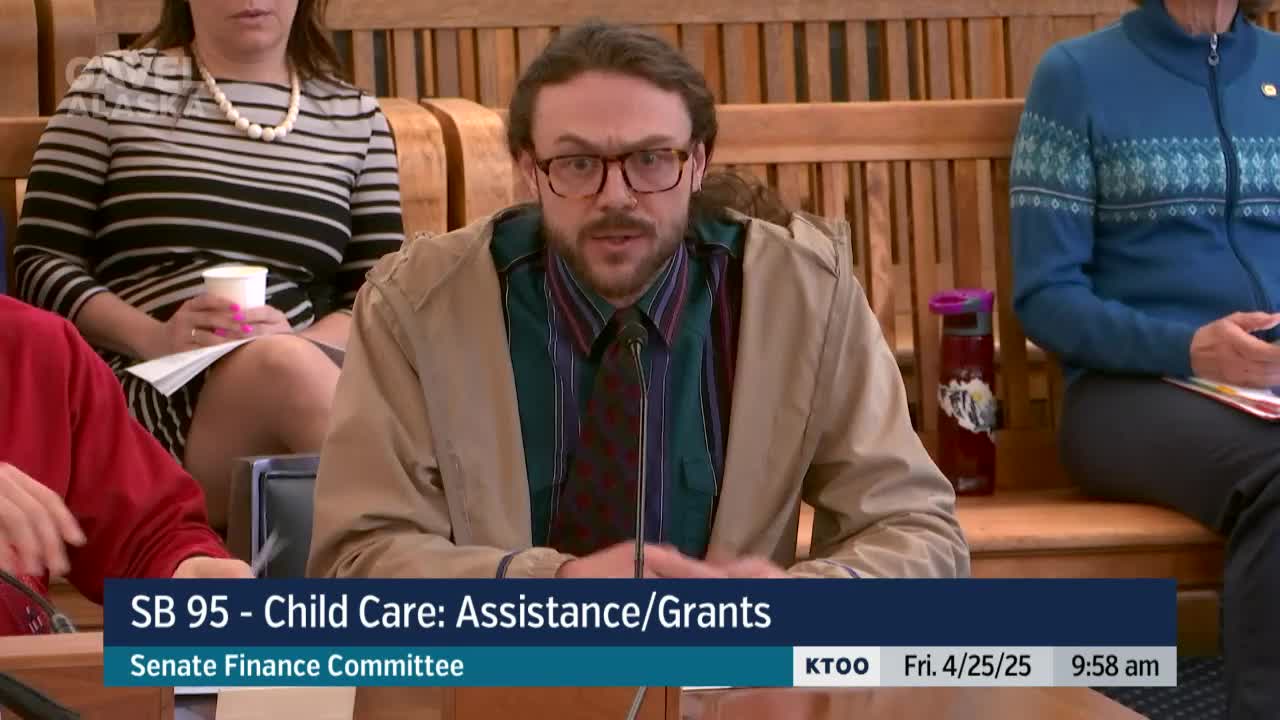Senate reviews SB96 to expand employer tax credits for child‑care benefits
Get AI-powered insights, summaries, and transcripts
Subscribe
Summary
Senate Finance on April 25 heard SB96, a bill to let employers claim tax credits for child‑care expenditures against a set of existing state taxes to encourage private investment in employer‑based child care.
Juneau — The Senate Finance Committee held a first hearing on Senate Bill 96 on April 25. SB96 would add child‑care expenditures to certain existing employer tax credits to encourage private investment in child‑care benefits, employer‑sponsored facilities and other supports.
Sonia Kawasaki, Senate Majority Legal Counsel, described the bill to the committee as a workforce measure: the proposal would expand existing education tax credits to allow credits for employer child‑care expenditures and payments. Kawasaki said the credit could be claimed against seven tax categories included in the bill: insurance premium taxes, title insurance premium tax, oil and gas production tax, oil and gas property tax, mining license tax, fisheries business tax and fishery resource landing tax.
Katie Capozzi, president and CEO of the Alaska Chamber, told the committee SB96 would provide an additional mechanism for employers to support child care. "Alaska's economy depends on a strong, stable workforce," Capozzi said, arguing that lack of affordable child care is a barrier to participation and that employer‑driven options could increase supply.
Stephanie Bergland, testifying again for the statewide child‑care resource organization SRED, said employer credits are a needed piece of a broader strategy and noted most licensed programs are not employer‑sponsored today. Department of Revenue staff and the committee clarified which entities could use the credit. Brandon Spanos, deputy director in the Department of Revenue Tax Division, explained that eligibility to claim the credit depends on whether an employer pays one of the taxes listed in the bill; companies structured so they do not pay those taxes (for example, certain pass‑through entities) would not be able to use the credit unless they pay an eligible tax.
Committee members asked for additional detail about which employers would realistically benefit and whether credits would disproportionately favor larger or C‑corporation style businesses. Capozzi said one practical pathway is for an employer to use the credit to create an on‑site or near‑site facility that could be open to employees of other employers as well.
SB96 includes a sunset timing change for the underlying education tax credit; testimony flagged that the bill shortens the existing credit’s sunset by one year (from 2029 to 2028) and that some chamber members were concerned about that change. Committee staff read three fiscal notes for SB96 showing no immediate state operating cost for labor market information or insurance operations and an indeterminate effect on state revenue when the tax credit sunsets.
Supporters urged the committee to advance the bill as part of a package to shore up child‑care supply; the committee set SB96 aside after the hearing for consideration at the conference table and for any further technical questions about tax eligibility.
No committee votes or amendments were recorded at the hearing.
